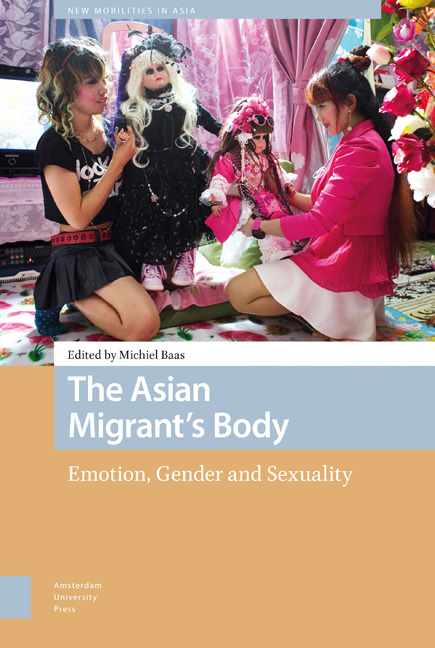Book contents
- Frontmatter
- Contents
- Introduction: Conceptualizing the Asian Migrant’s Body
- 1 ‘Not a Lesbian in Dubai, Not gay in Tehran’: Sexualities, Migrations, and Social Movements across the Gulf
- 2 Bodies at Work: Gendered Performance and Migrant Beer Sellers in Southeast Asia
- 3 Body, Space, and Migrant Ties: Migrant Domestic Workers and Embodied Resistances in Lebanon
- 4 The Day Off Policy , ‘Reverse Domestication’, and Emotional Labour among Indonesian Domestic Workers in Singapore: Maria Platt, Brenda S.A. Yeoh, Khoo Choon Yen, Grace Baey and Theodora Lam
- 5 Embodying the Good Migrant in Ageing: Negotiating Positive Subjectivities Through Paid Work
- 6 Proper Conjugation of Bodies: Chastity, Age, and Care Work in Sri Lankan Migrants’ Families
- 7 Border-crossing as Sexual Subjects: Interracial Dating Experience of Young Chinese in New Zealand
- 8 Managing Touch: The Racialized Dynamics of Intimacy in the Los Angeles Beauty Industry
- Notes on Contributors
- Index
1 - ‘Not a Lesbian in Dubai, Not gay in Tehran’: Sexualities, Migrations, and Social Movements across the Gulf
Published online by Cambridge University Press: 23 June 2021
- Frontmatter
- Contents
- Introduction: Conceptualizing the Asian Migrant’s Body
- 1 ‘Not a Lesbian in Dubai, Not gay in Tehran’: Sexualities, Migrations, and Social Movements across the Gulf
- 2 Bodies at Work: Gendered Performance and Migrant Beer Sellers in Southeast Asia
- 3 Body, Space, and Migrant Ties: Migrant Domestic Workers and Embodied Resistances in Lebanon
- 4 The Day Off Policy , ‘Reverse Domestication’, and Emotional Labour among Indonesian Domestic Workers in Singapore: Maria Platt, Brenda S.A. Yeoh, Khoo Choon Yen, Grace Baey and Theodora Lam
- 5 Embodying the Good Migrant in Ageing: Negotiating Positive Subjectivities Through Paid Work
- 6 Proper Conjugation of Bodies: Chastity, Age, and Care Work in Sri Lankan Migrants’ Families
- 7 Border-crossing as Sexual Subjects: Interracial Dating Experience of Young Chinese in New Zealand
- 8 Managing Touch: The Racialized Dynamics of Intimacy in the Los Angeles Beauty Industry
- Notes on Contributors
- Index
Summary
Abstract
Activism around sexuality and sexual politics has been increasing in the last two decades resulting in the production of both challenges and opportunities for the negotiation of sexual subjectivities, intimacy, and politics. However, some articulate a desire to untangle sexual politics from identity politics. My interlocutors define sexual politics as twofold: the strategic deployment of sexuality to affect social and political change, as well as activism with the goal of rethinking ideas and norms about sexuality. This chapter argues that the overwhelming urge to untangle sexual politics from identity politics is producing the desire for a new type of intimate politics characterized by mobility. This in turn is producing a type of migration that is tied to a quest for intimate privacy.
Keywords: sexuality, intimate mobilities, identity politics, Iran, UAE
Introduction
‘I came here [to Dubai] because I was tired of my sexuality, my body, my “me” being politicised. I came because I wanted to get away from all that, to fall in love, to work, to be, just me’, explained Anoma, a young Pakistani migrant living in Dubai in 2012. At the age of twenty-three, Anoma made the decision to move from her home in Lahore after two of her friends were arrested in 2011 for participating in a campaign to promote awareness of LGBTQQ issues. Anoma was born and raised in Pakistan to working-class parents as defined by their level of education and income. The youngest of four children, Anoma attended university in Karachi where she studied finance. When she graduated, she took up employment with her father at a local bank back in Lahore.
When Anoma was fifteen years old, she started dating women. ‘I guess you could say that I “became” a lesbian then, but I don't see it that way, and I never really liked that label’, she said. A tall woman with cropped black hair that falls in her face when she speaks, Anoma talked about her sexuality with passion, but was emphatic that though this was an important topic to her, she did not want her sexuality to be categorized or politicized. ‘To me, it seems like you should be able to love who you want, to have sex with who you want, and for it not to be so political. But where I went to uni [university] it wasn't like that.
- Type
- Chapter
- Information
- The Asian Migrant's BodyEmotion, Gender and Sexuality, pp. 29 - 52Publisher: Amsterdam University PressPrint publication year: 2020

